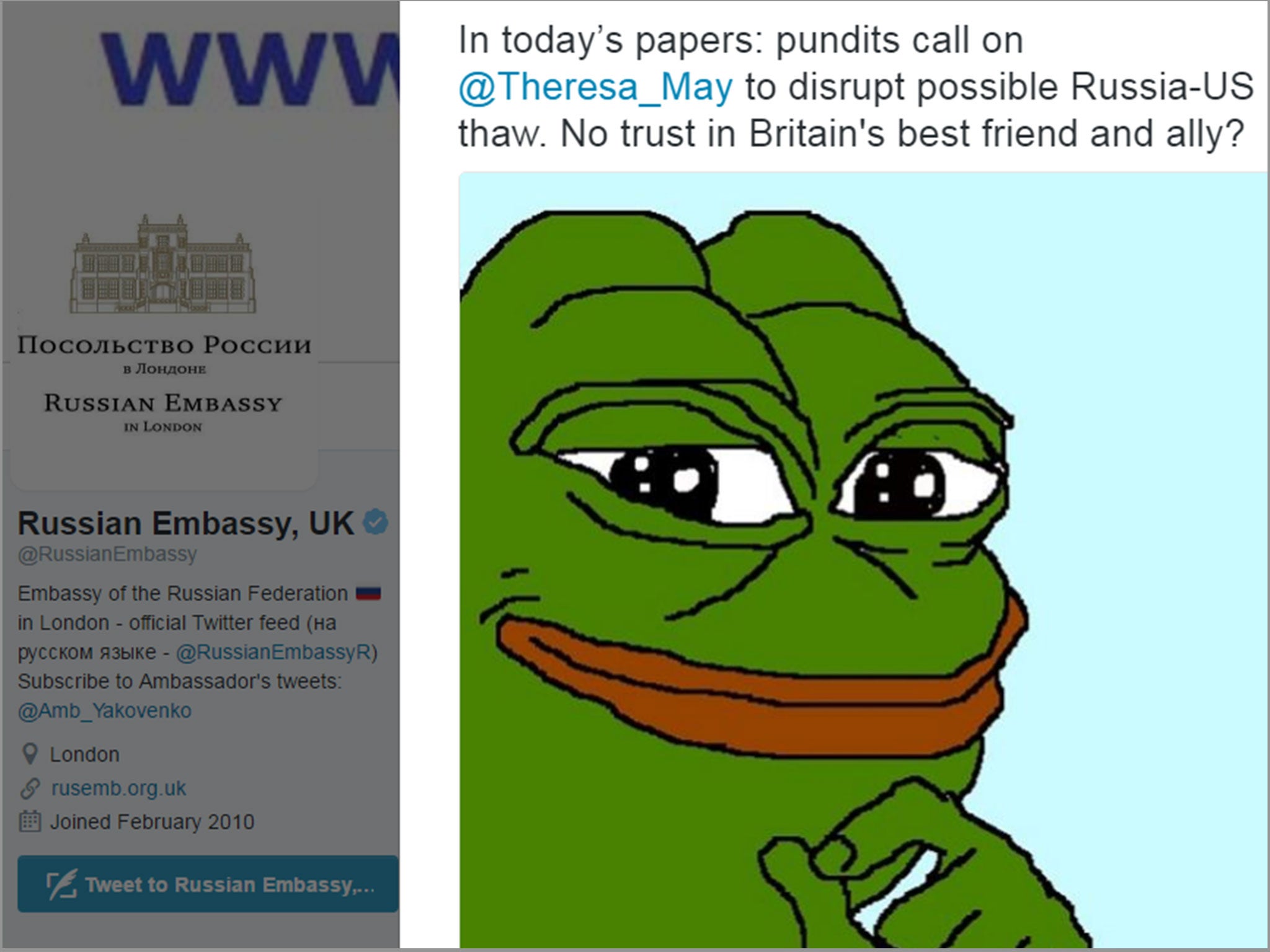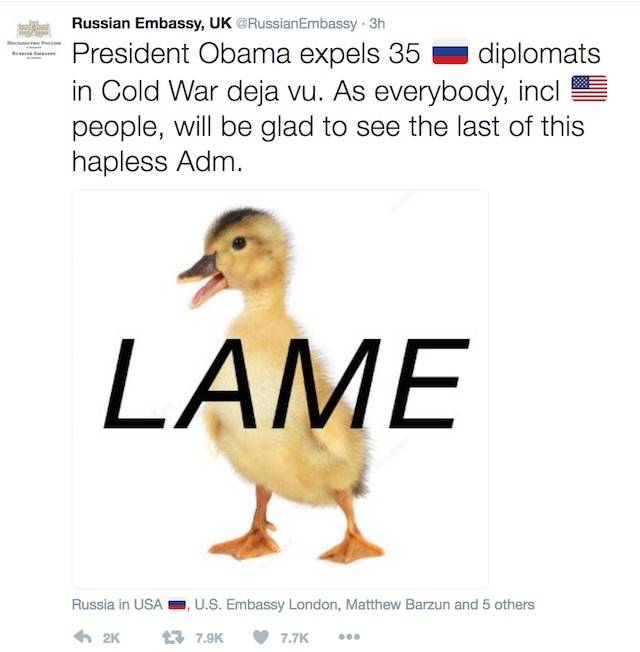Litwin
Platinum Member
this is how practically works Muscovite hybrid war machine, Facebook, tweeter are closing the doors to Kremlin hybrid war machine, how soon our forum will follow Facebook, tweeter lead and closed the doors to the Olgino trolls?
"
This week, the official Russian Embassy to the UK tweeted Pepe the Frog to British Prime Minister Theresa May, an apparent attempt to make a mockery of the UK's relationship with both the US and Russia. Obviously not traditional procedure for such an institute, right? Fighting the good fight of national interest is fairly normal for embassies, sure, but using a politically volatile and racist meme? Less so.
Nevertheless, there it is, going viral as a dog whistle for Trump fans and alt-righters worldwide. Or so the thinking goes.
On first glance, the Embassy's deployment of Pepe may seem intended to target the usual SJWs and snowflakes. But take a step back, and you can see it's one of just many tactics that the London-based embassy has started exercising to go after the Western press. This is a social media propaganda game than extends from Twitter, to Facebook, to the embassy's own website. And it isn't a one off; it's the latest salvo in the Trump-era infowars.
For months now, between its expected tweets about the innocuous daily goings-on of a diplomatic office—images of London's Hyde Park, or patriotic news clippings about Russia's cultural escapades in the UK—are darker, less predictable tweets. The Russian embassy's Twitter account has been lobbing attacks at media outlets such as the BBC and The Guardian newspaper, often tagging Western news publications directly in its posts.
Take this one for instance, which attacks the British media's nonchalance to potential CIA hack reports that don't include accusations of Russian involvement. "Breaking News: I Don't Care" reads the quasi-meme, mocking the press not wanting to run stories that don't include salacious finger-pointing of Russian hackers.
Then December saw the "Lame Duck" meme criticising Obama's expulsion of 35 Russian diplomats in response to accusations of Russian involvement in the US election. The image caught the attention of the international press. The account was getting noticed.
Motherboard requested an interview with the social media manager of the account, but the embassy had yet to respond to our request as of publication. It's likely the account has more than one user.
"These memes work which is why the Embassy uses them. They attract more attention from readers because they share the informal, often jokey style of other successful Twitter-users," Charlie Beckett, professor in the Department of Media and Communications at London School of Economics, told Motherboard in an email.
"The Tweets don't particularly seek to convey hard facts or detailed information," Beckett continued. "Twitter isn't that good at doing that anyway. Instead, they are seeking to disrupt conventional narratives and to provide an alternative perspective in a way that is hard to counter with the usual style of 'rational' argument."
I asked Beckett whether the embassy may be mirroring Trump's unorthodox use of Twitter. He told me that he doubts the account is doing so deliberately, but that it has a similar strategy. "In that sense, their task is to spread doubt, at least, about the 'other side's' argument. Even when they attract critical responses they have achieved their aim of raising the profile of the Russian point of view," said Beckett.
And raise the profile it has. The Pepe tweet has been covered by a plethora of media publications, including Motherboard (twice now). The tweet, at the time of publication, has just shy of 6,000 retweets and almost 10,000 likes. Stratospheric!
On Tuesday came a further scathing attack on British press, directed mostly at The Sunday Times, from the embassy's official website. In a blog post, an unnamed author speaks out against a perceived "impending official anti-Russian witch hunt in Britain, " goading the British press into covering their side of the story.
It's confusing. It's schizophrenic. But maybe that's the point. Russia is using the same meme-laden mindset as much of the alt-right does to confound, attack, and mock critics. Memes, Twitter, and offbeat blog posts remain a surprisingly effective tactic of retaliation for an institution that's supposed to play by the old rules of politics and media, such as official press conferences or memos to journalists. This is 2017, and in a climate of fake news, misinformation, and extreme political prejudices borne out of Facebook filter bubbles, the attention the Pepe tweet is garnering shows there's no need to play by the rules of official protocol anymore."


It’s Not Just Pepe, The Russian Embassy Has Been Trolling on Twitter For Months
"
This week, the official Russian Embassy to the UK tweeted Pepe the Frog to British Prime Minister Theresa May, an apparent attempt to make a mockery of the UK's relationship with both the US and Russia. Obviously not traditional procedure for such an institute, right? Fighting the good fight of national interest is fairly normal for embassies, sure, but using a politically volatile and racist meme? Less so.
Nevertheless, there it is, going viral as a dog whistle for Trump fans and alt-righters worldwide. Or so the thinking goes.
On first glance, the Embassy's deployment of Pepe may seem intended to target the usual SJWs and snowflakes. But take a step back, and you can see it's one of just many tactics that the London-based embassy has started exercising to go after the Western press. This is a social media propaganda game than extends from Twitter, to Facebook, to the embassy's own website. And it isn't a one off; it's the latest salvo in the Trump-era infowars.
For months now, between its expected tweets about the innocuous daily goings-on of a diplomatic office—images of London's Hyde Park, or patriotic news clippings about Russia's cultural escapades in the UK—are darker, less predictable tweets. The Russian embassy's Twitter account has been lobbing attacks at media outlets such as the BBC and The Guardian newspaper, often tagging Western news publications directly in its posts.
Take this one for instance, which attacks the British media's nonchalance to potential CIA hack reports that don't include accusations of Russian involvement. "Breaking News: I Don't Care" reads the quasi-meme, mocking the press not wanting to run stories that don't include salacious finger-pointing of Russian hackers.
Then December saw the "Lame Duck" meme criticising Obama's expulsion of 35 Russian diplomats in response to accusations of Russian involvement in the US election. The image caught the attention of the international press. The account was getting noticed.
Motherboard requested an interview with the social media manager of the account, but the embassy had yet to respond to our request as of publication. It's likely the account has more than one user.
"These memes work which is why the Embassy uses them. They attract more attention from readers because they share the informal, often jokey style of other successful Twitter-users," Charlie Beckett, professor in the Department of Media and Communications at London School of Economics, told Motherboard in an email.
"The Tweets don't particularly seek to convey hard facts or detailed information," Beckett continued. "Twitter isn't that good at doing that anyway. Instead, they are seeking to disrupt conventional narratives and to provide an alternative perspective in a way that is hard to counter with the usual style of 'rational' argument."
I asked Beckett whether the embassy may be mirroring Trump's unorthodox use of Twitter. He told me that he doubts the account is doing so deliberately, but that it has a similar strategy. "In that sense, their task is to spread doubt, at least, about the 'other side's' argument. Even when they attract critical responses they have achieved their aim of raising the profile of the Russian point of view," said Beckett.
And raise the profile it has. The Pepe tweet has been covered by a plethora of media publications, including Motherboard (twice now). The tweet, at the time of publication, has just shy of 6,000 retweets and almost 10,000 likes. Stratospheric!
On Tuesday came a further scathing attack on British press, directed mostly at The Sunday Times, from the embassy's official website. In a blog post, an unnamed author speaks out against a perceived "impending official anti-Russian witch hunt in Britain, " goading the British press into covering their side of the story.
It's confusing. It's schizophrenic. But maybe that's the point. Russia is using the same meme-laden mindset as much of the alt-right does to confound, attack, and mock critics. Memes, Twitter, and offbeat blog posts remain a surprisingly effective tactic of retaliation for an institution that's supposed to play by the old rules of politics and media, such as official press conferences or memos to journalists. This is 2017, and in a climate of fake news, misinformation, and extreme political prejudices borne out of Facebook filter bubbles, the attention the Pepe tweet is garnering shows there's no need to play by the rules of official protocol anymore."


It’s Not Just Pepe, The Russian Embassy Has Been Trolling on Twitter For Months
